2024年中考英语二轮句法复习课件:第十一节 句子种类、简单句、主谓一致(共36张PPT)
文档属性
| 名称 | 2024年中考英语二轮句法复习课件:第十一节 句子种类、简单句、主谓一致(共36张PPT) |
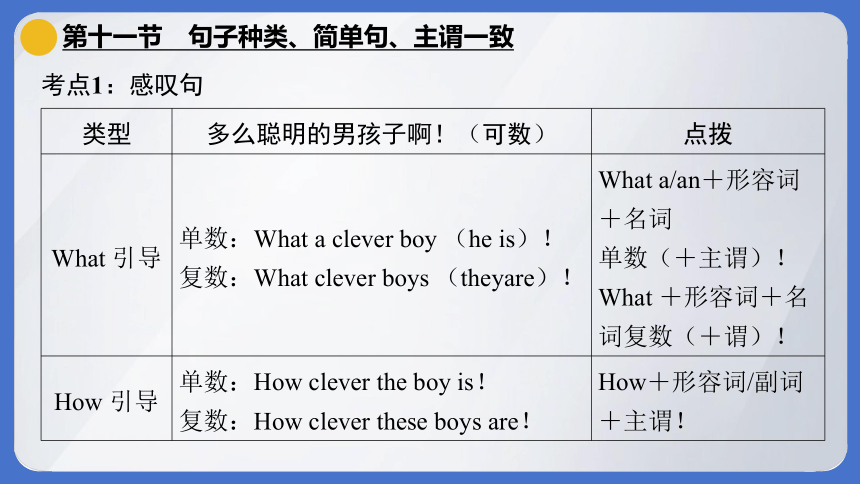
|
|
| 格式 | pptx | ||
| 文件大小 | 1.3MB | ||
| 资源类型 | 教案 | ||
| 版本资源 | 通用版 | ||
| 科目 | 英语 | ||
| 更新时间 | 2024-02-25 17:57:48 | ||
图片预览

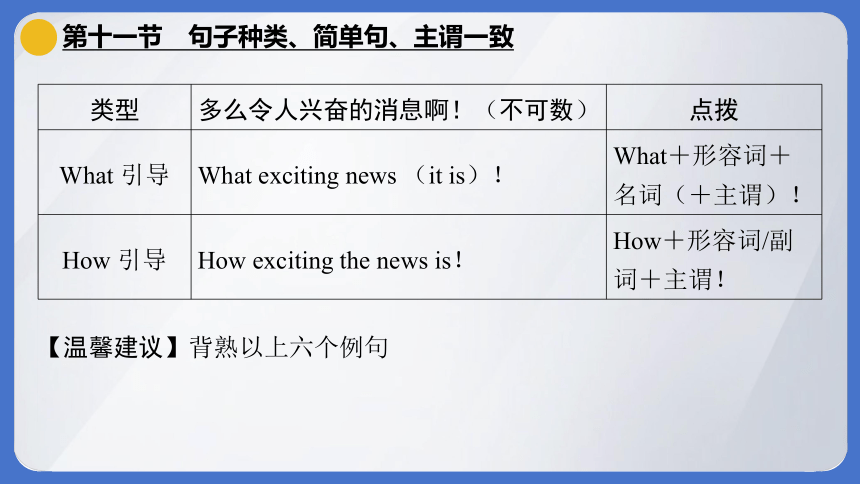
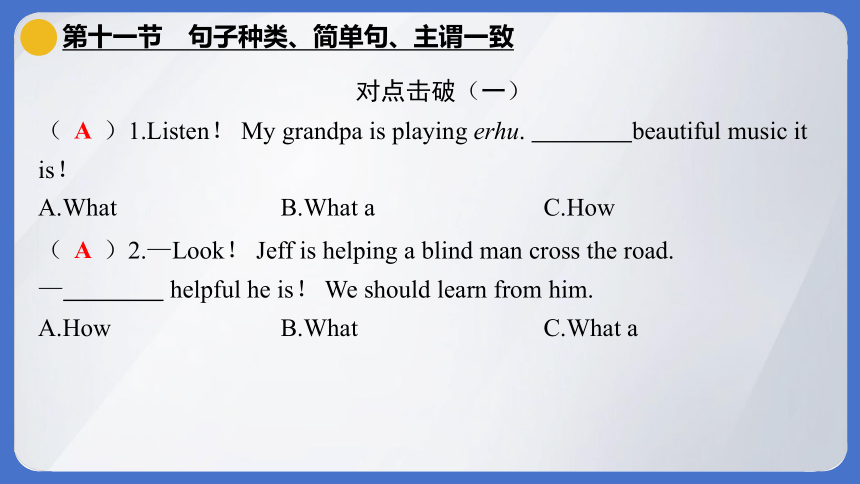
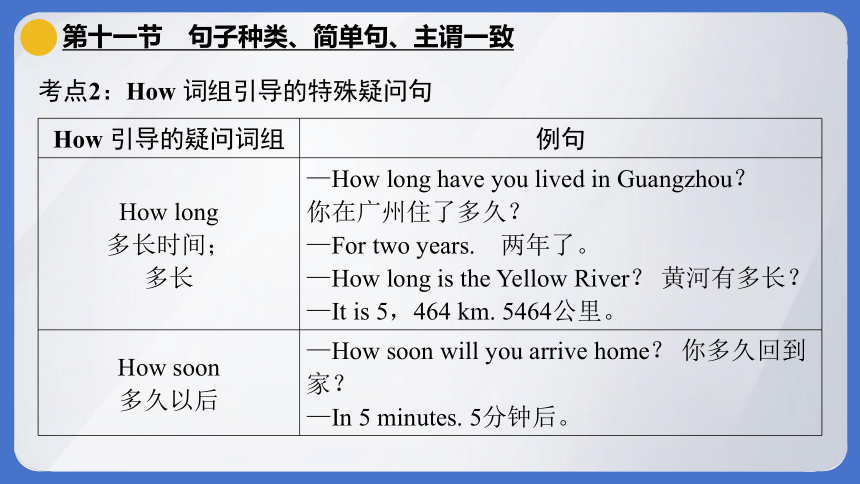
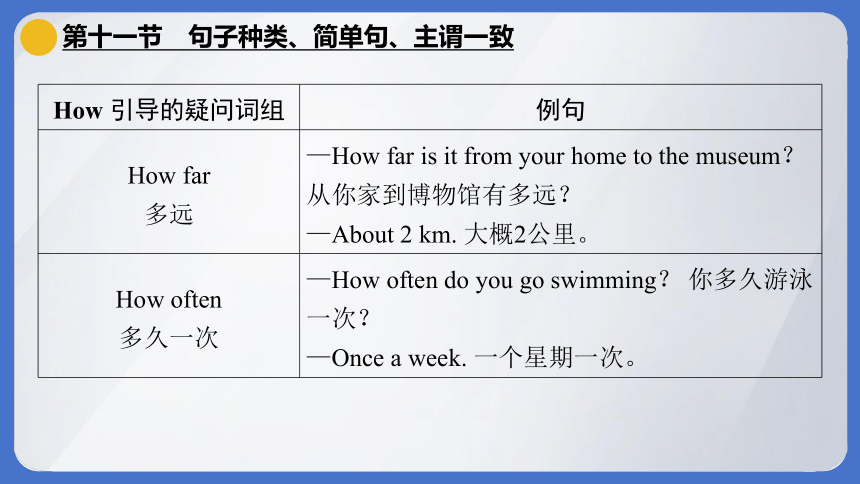
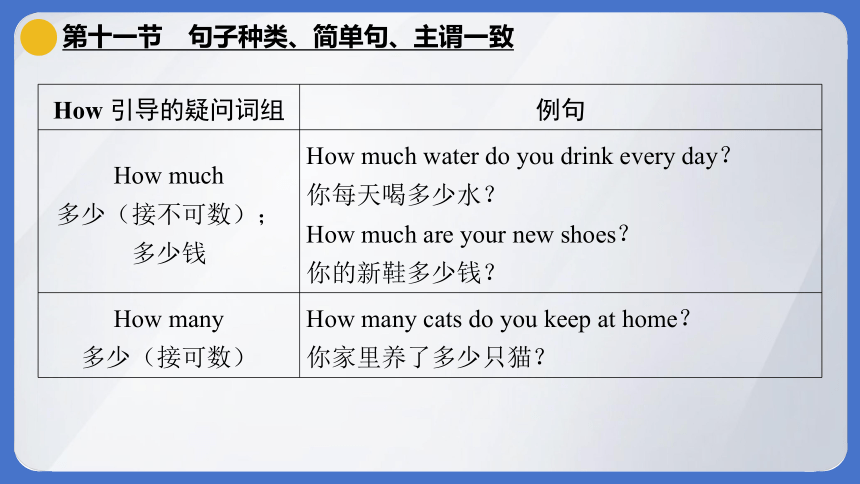
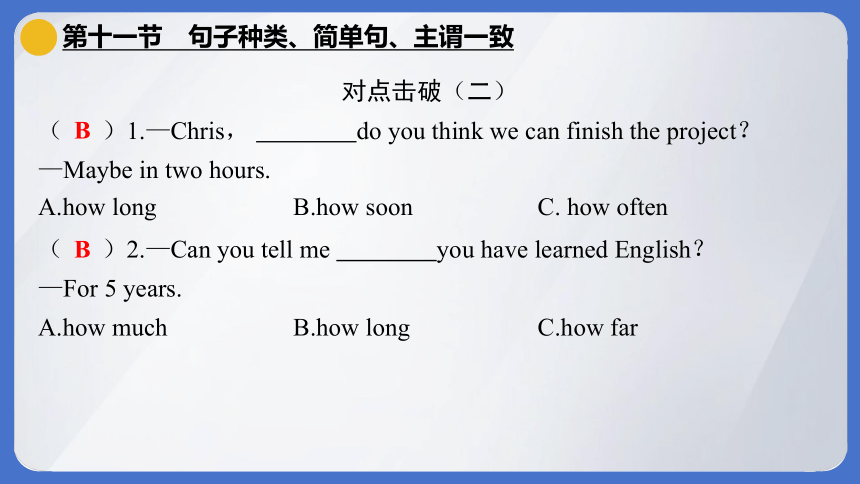
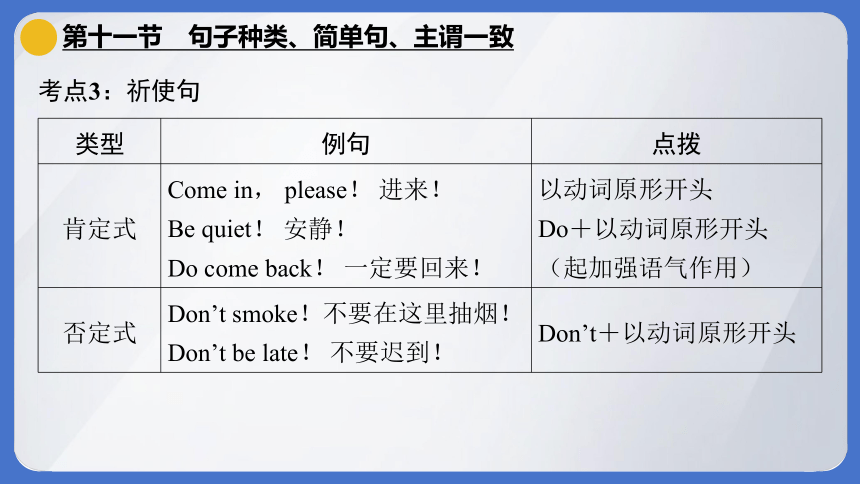
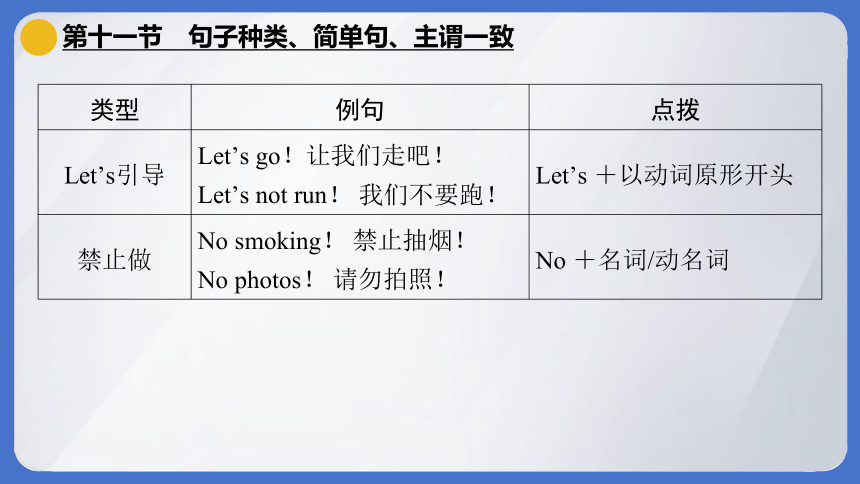
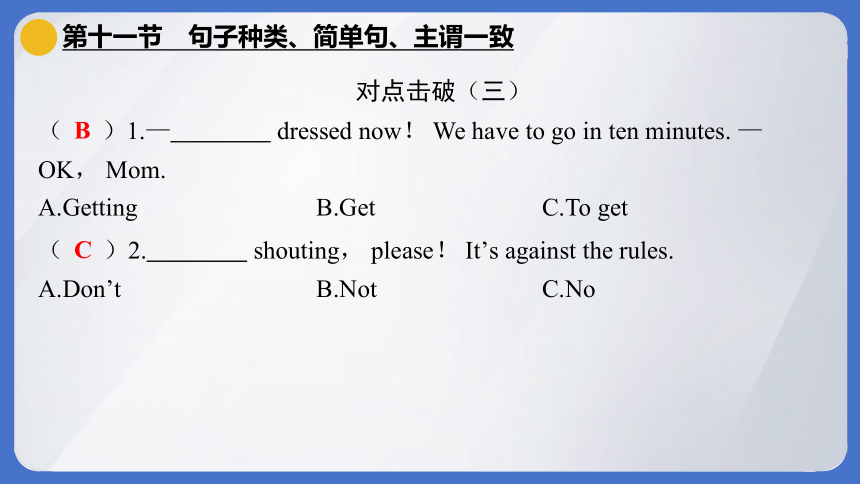
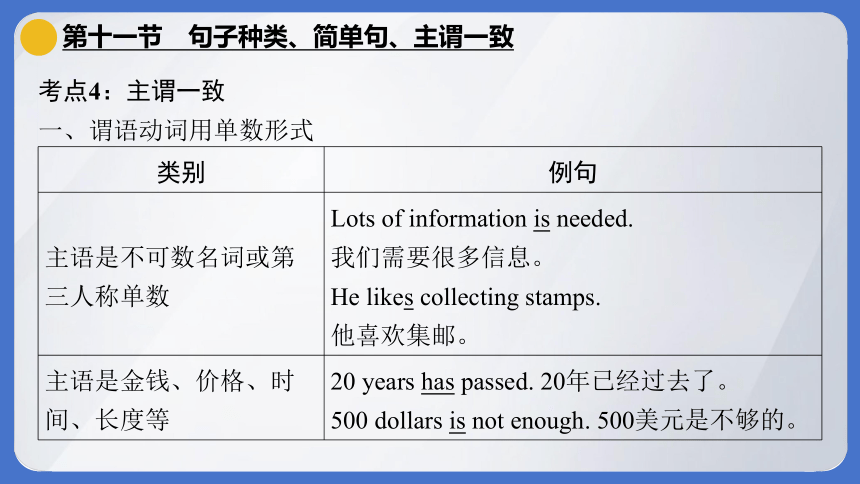
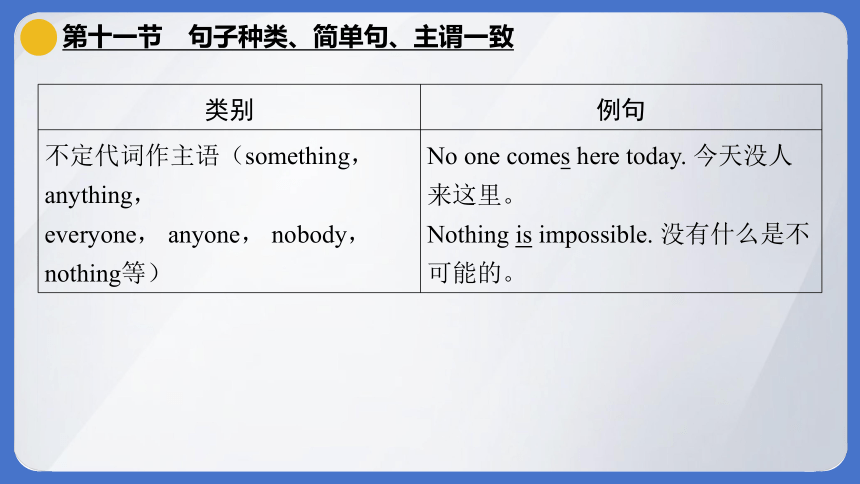
文档简介
(共36张PPT)
考点1:感叹句
类型 多么聪明的男孩子啊!(可数) 点拨
What 引导 单数:What a clever boy (he is)! 复数:What clever boys (theyare)! What a/an+形容词+名词
单数(+主谓)!
What +形容词+名词复数(+谓)!
How 引导 单数:How clever the boy is! 复数:How clever these boys are! How+形容词/副词+主谓!
类型 多么令人兴奋的消息啊!(不可数) 点拨
What 引导 What exciting news (it is)! What+形容词+名词(+主谓)!
How 引导 How exciting the news is! How+形容词/副词+主谓!
【温馨建议】背熟以上六个例句
对点击破(一)
( A )1.Listen! My grandpa is playing erhu. beautiful music it
is!
A.What B.What a C.How
( A )2.—Look! Jeff is helping a blind man cross the road.
— helpful he is! We should learn from him.
A.How B.What C.What a
A
A
考点2:How 词组引导的特殊疑问句
How 引导的疑问词组 例句
How long 多长时间; 多长 —How long have you lived in Guangzhou?
你在广州住了多久?
—For two years. 两年了。
—How long is the Yellow River? 黄河有多长?
—It is 5,464 km. 5464公里。
How soon 多久以后 —How soon will you arrive home? 你多久回到
家?
—In 5 minutes. 5分钟后。
How 引导的疑问词组 例句
How far 多远 —How far is it from your home to the museum?
从你家到博物馆有多远?
—About 2 km. 大概2公里。
How often 多久一次 —How often do you go swimming? 你多久游泳
一次?
—Once a week. 一个星期一次。
How 引导的疑问词组 例句
How much 多少(接不可数); 多少钱 How much water do you drink every day?
你每天喝多少水?
How much are your new shoes?
你的新鞋多少钱?
How many 多少(接可数) How many cats do you keep at home?
你家里养了多少只猫?
对点击破(二)
( B )1.—Chris, do you think we can finish the project?
—Maybe in two hours.
A.how long B.how soon C. how often
( B )2.—Can you tell me you have learned English?
—For 5 years.
A.how much B.how long C.how far
B
B
考点3:祈使句
类型 例句 点拨
肯定式 Come in, please! 进来! Be quiet! 安静! Do come back! 一定要回来! 以动词原形开头
Do+以动词原形开头 (起加强语气作用)
否定式 Don’t smoke!不要在这里抽烟! Don’t be late! 不要迟到! Don’t+以动词原形开头
类型 例句 点拨
Let’s引导 Let’s go!让我们走吧! Let’s not run! 我们不要跑! Let’s +以动词原形开头
禁止做 No smoking! 禁止抽烟! No photos! 请勿拍照! No +名词/动名词
对点击破(三)
( B )1.— dressed now! We have to go in ten minutes. —
OK, Mom.
A.Getting B.Get C.To get
( C )2. shouting, please! It’s against the rules.
A.Don’t B.Not C.No
B
C
考点4:主谓一致
一、谓语动词用单数形式
类别 例句
主语是不可数名词或第三人称单数 Lots of information is needed.
我们需要很多信息。
He likes collecting stamps.
他喜欢集邮。
主语是金钱、价格、时间、长度等 20 years has passed. 20年已经过去了。
500 dollars is not enough. 500美元是不够的。
类别 例句
不定代词作主语(something,
anything, everyone, anyone, nobody,
nothing等) No one comes here today. 今天没人
来这里。
Nothing is impossible. 没有什么是不
可能的。
类别 例句
主语是动词不定式或动名词 To enter a good university is his dream.
进入一所好的大学是他的梦想。
Watching cartoons has lots of fun.
看动画片很有趣。
主语是“The number of… (……的数量)” The number of passengers is 500.
乘客的数量是500人。
对点击破(四)
( B )1.The number of whales smaller and smaller because of
human activities now.
A.were B.is C.are
( C )2.Everyone in the classroom now. Let’s start the class.
A.am B.are C.is
B
C
二、谓语动词用复数形式
类别 例句
主语是可数名词复数 Students are all waiting for their teachers.
学生们都正在等着他们的老师。
Your trousers are dirty.
你的裤子脏了。
主语是“the+形容词(表
示一类人)” The young like to go traveling abroad now.
现在年轻人喜欢出国旅游。
类别 例句
主语是“the+姓氏的复数形式
(表示一家人)” The smiths are having a holiday in Japan.
史密斯一家正在日本度假。
主语是“A number of/A lot of +可数名词复数(许多)” A number of kids learn to play the piano.
许多小孩子学习弹钢琴。
主语是people, police等集体名词 The police are looking for a lost boy.
警察正在寻找一名丢失的男孩。
对点击破(五)
( B )1.The Whites having a party now.
A.is B.are C.were
( B )2.A number of used textbooks to the village schools last
month.
A.was given away B.were given away C.gave away
B
B
三、就近原则
类别 例句 点拨
either…or… 要么……要么……, 或者……或者…… Either Jim or his cousins have been to America. 要么吉姆要么他的堂弟们去过美国。 谓语动词就近
cousins,故用have
neither…nor… 既不……也不…… Neither James nor you are right. James不对,你也不对。 谓语动词就近
you,故用are
类别 例句 点拨
not only…but also… 不仅……而且…… Not only you but also she likes the song. 不仅你,而且她也喜欢这首歌。 谓语动词就近
she,故用likes
There be…句型 There are five trees and one dog in
the garden. 花园里有五棵树和一条狗。 be动词靠近five trees, 故用are
There is one dog and five trees in
the garden. 花园里有一条狗和五棵树。 be 动词靠近one dog,故用is
对点击破(六)
( C )1. my parents my brother has gone surfing. They
leave me alone on the beach.
A.Either; or B.Neither; nor C.Not only; but also
( C )2.There is some in the noodles.
A.potatoes B.egg C.beef
C
C
四、就远原则
类别 例句 点拨
主语后面接with,
together with, as
well as, like,
besides, except等
词时,谓语动词
由主语决定 The teacher with two students is at the meeting. 老师和两个学生正在开会。 谓语动词跟最前面的主语The teacher保持一致,故用is
All the students except him have passed the exam. 除了他之外,所有的学生都考试及格了。 谓语动词跟最前面的主语All the students保持一致,故用have
对点击破(七)
( A )1.Mr. Wang, together with his children in Guangzhou.
A.enjoys living B.enjoy living C.don’t enjoy living
( B )2.Everyone except Tom and Sarah there when the class
began.
A.are B.was C.were
A
B
五、取决于具体情况
类别 谓语动词取决于 例句
主语是“分数或百分比+名词” 名词 Two thirds of the books are old.
三分之二的书是旧的。
Two thirds of the water is polluted.
三分之二的水被污染了。
主语是“量词短语+名词”如 a pair of, two kilos of, three glasses of等 量词 A pair of gloves is on her hands.
她手上戴着一双手套。
Five pairs of gloves are sold out.
5双手套都卖了。
对点击破(八)
( B )1. of the news written in English on the Internet.
A.Three quarters; are B.Three quarters; is
C.A quarter; are
( B )2.Waiter, five glasses of beer needed for this table,
please.
A.is B.are C.am
B
B
( B )1.There only one earth but billions of(数十亿) people
in the world, so we should protect the earth.
A.am B.is C.are
( B )2.—The song Together for a Shared Future is very popular now.
—That’s for sure! Both the young and the old it.
A.likes B.like C.liked
B
B
( A )3.In our school library, there a number of books on art.
The number of the books still growing larger and larger.
A.are; is B.is; are C.are; are
A
( C )4.—Let’s eat some snacks.
—Better not. Eating in the library.
A.are not allowed B.doesn’t allow C.is not allowed
( C )5.—Hurry up, Jason! We’re going to the cinema, but the
clothes still need .
—Don’t worry. I think thirty minutes enough.
A.wash; is B.to wash; are C.to be washed; is
C
C
( B )6.Nowadays, cycling, as well as jogging and
swimming, as one of the best overall body workout.
A.thought B.is thought C.are thought
( C )7.—Susan, how many women teachers are there in your school?
—In our school, of the teachers women teachers. We
have more women teachers than men teachers.
A.one third; are B.two thirds; is
C.three fourths; are
B
C
( C )9.Thanks to the use of 5G technology, ways of
communication a lot.
A.improves B.has improved C.have improved
( A )10.—What do you think of the environment here?
—Wonderful! of the land covered with trees and grass.
A.Two fifths; is B.Two fifths; are
C.Two fifths; was
C
A
( A )8. my father my mother have gone to take a wall.
A.Both; and B.Neither; nor C.Not only; but also
A
一、语法选择
Once there were many thousands of Gourma Desert(沙漠) elephants
in Mali, a country in West Africa. Now, there 1 fewer than four
hundred.
The number of the elephants 2 small now. Why? On the one
hand, the elephants’ main lake, their only water source(来源) dried up.
On the other hand, the land which the elephants lived on 3 overused
(过度使用) by humans.
To protect the elephants’ living environment, the Mali Elephant Project
(MEP) was started in 2007. MEP met with local people and helped them
make rules of using land and water. As a result, the situation became better
and there 4 more food, forest and grassland.
However, from 2012 to 2016, poaching(偷猎) and illegal(非法
的) trade in the elephants increased rapidly. Eighty-three elephants 5
lost in 2015 alone, and another fifty-one elephants 6 killed in 2016.
“If this situation goes on, all the Gourma elephants will be killed by 2020,” said a member of MEP.
Luckily, the voice of MEP 7 . More organizations(组织) 8
together to educate the local people that trading elephants 9 against the
law. Elephant poaching has dropped to a very low level. The local people
10 to live peacefully with the elephants, one of the wildlife treasures in the world.
( A )1.A.are B.is C.were
( C )2.A.are B.was C.is
( A )3.A.was B.were C.are
( A )4.A.was B.is C.were
( A )5.A.were B.was C.is
( A )6.A.were B.was C.is
( B )7.A.heard B.was heard C.were heard
( B )8.A.has joined B.have joined C.was joined
( B )9.A.are B.is C.am
( C )10.A.has learned B.were learned C.have learned
A
C
A
A
A
A
B
B
B
C
二、短文填空(新考法)
请从方框内选择适当的词并用其正确形式填空,使文章完整连贯。
注意每空一词,每词仅用一次,有两词为多余项。
take soon go much be how what
where don’t tell there when
Last summer vacation, I went to New York to visit my uncle. On the
last day of the journey, I made an interesting mistake that I would never
forget. Let me 1 you what happened.
My uncle parked his car at the gate of a supermarket. Then he asked
me, “ 2 to buy some gifts and take them home by yourself.” After
payment, I left the supermarket. There 3 a car that looked like my
uncle’s.I opened the door and went straight in to the car.
Suddenly I heard a woman’s cough from the driver’s seat. 4 shocked I was! Soon I realized something was wrong! The woman looked
at me in surprise and asked, “ Is 5 anything I can help you?” I said
sorry and got off the car immediately(立即). I called my uncle, “ 6
are you now?” My uncle said he was in the parking lot. Ten minutes later, my uncle hasn’t come yet, so I called impatiently, “How 7 will you come?” He said patiently, “In two minutes, dear.”
Later, my uncle picked me up. Hearing what happened, my aunt
said, “ 8 an amazing experience! 9 it easy!It doesn’t matter. 10 forget to check the car number next time.” I promised I would.
1. 2. 3. 4.
5. 6. 7. 8.
9. 10.
tell
Go
was
How
there
Where
soon
What
Take
Don’t
考点1:感叹句
类型 多么聪明的男孩子啊!(可数) 点拨
What 引导 单数:What a clever boy (he is)! 复数:What clever boys (theyare)! What a/an+形容词+名词
单数(+主谓)!
What +形容词+名词复数(+谓)!
How 引导 单数:How clever the boy is! 复数:How clever these boys are! How+形容词/副词+主谓!
类型 多么令人兴奋的消息啊!(不可数) 点拨
What 引导 What exciting news (it is)! What+形容词+名词(+主谓)!
How 引导 How exciting the news is! How+形容词/副词+主谓!
【温馨建议】背熟以上六个例句
对点击破(一)
( A )1.Listen! My grandpa is playing erhu. beautiful music it
is!
A.What B.What a C.How
( A )2.—Look! Jeff is helping a blind man cross the road.
— helpful he is! We should learn from him.
A.How B.What C.What a
A
A
考点2:How 词组引导的特殊疑问句
How 引导的疑问词组 例句
How long 多长时间; 多长 —How long have you lived in Guangzhou?
你在广州住了多久?
—For two years. 两年了。
—How long is the Yellow River? 黄河有多长?
—It is 5,464 km. 5464公里。
How soon 多久以后 —How soon will you arrive home? 你多久回到
家?
—In 5 minutes. 5分钟后。
How 引导的疑问词组 例句
How far 多远 —How far is it from your home to the museum?
从你家到博物馆有多远?
—About 2 km. 大概2公里。
How often 多久一次 —How often do you go swimming? 你多久游泳
一次?
—Once a week. 一个星期一次。
How 引导的疑问词组 例句
How much 多少(接不可数); 多少钱 How much water do you drink every day?
你每天喝多少水?
How much are your new shoes?
你的新鞋多少钱?
How many 多少(接可数) How many cats do you keep at home?
你家里养了多少只猫?
对点击破(二)
( B )1.—Chris, do you think we can finish the project?
—Maybe in two hours.
A.how long B.how soon C. how often
( B )2.—Can you tell me you have learned English?
—For 5 years.
A.how much B.how long C.how far
B
B
考点3:祈使句
类型 例句 点拨
肯定式 Come in, please! 进来! Be quiet! 安静! Do come back! 一定要回来! 以动词原形开头
Do+以动词原形开头 (起加强语气作用)
否定式 Don’t smoke!不要在这里抽烟! Don’t be late! 不要迟到! Don’t+以动词原形开头
类型 例句 点拨
Let’s引导 Let’s go!让我们走吧! Let’s not run! 我们不要跑! Let’s +以动词原形开头
禁止做 No smoking! 禁止抽烟! No photos! 请勿拍照! No +名词/动名词
对点击破(三)
( B )1.— dressed now! We have to go in ten minutes. —
OK, Mom.
A.Getting B.Get C.To get
( C )2. shouting, please! It’s against the rules.
A.Don’t B.Not C.No
B
C
考点4:主谓一致
一、谓语动词用单数形式
类别 例句
主语是不可数名词或第三人称单数 Lots of information is needed.
我们需要很多信息。
He likes collecting stamps.
他喜欢集邮。
主语是金钱、价格、时间、长度等 20 years has passed. 20年已经过去了。
500 dollars is not enough. 500美元是不够的。
类别 例句
不定代词作主语(something,
anything, everyone, anyone, nobody,
nothing等) No one comes here today. 今天没人
来这里。
Nothing is impossible. 没有什么是不
可能的。
类别 例句
主语是动词不定式或动名词 To enter a good university is his dream.
进入一所好的大学是他的梦想。
Watching cartoons has lots of fun.
看动画片很有趣。
主语是“The number of… (……的数量)” The number of passengers is 500.
乘客的数量是500人。
对点击破(四)
( B )1.The number of whales smaller and smaller because of
human activities now.
A.were B.is C.are
( C )2.Everyone in the classroom now. Let’s start the class.
A.am B.are C.is
B
C
二、谓语动词用复数形式
类别 例句
主语是可数名词复数 Students are all waiting for their teachers.
学生们都正在等着他们的老师。
Your trousers are dirty.
你的裤子脏了。
主语是“the+形容词(表
示一类人)” The young like to go traveling abroad now.
现在年轻人喜欢出国旅游。
类别 例句
主语是“the+姓氏的复数形式
(表示一家人)” The smiths are having a holiday in Japan.
史密斯一家正在日本度假。
主语是“A number of/A lot of +可数名词复数(许多)” A number of kids learn to play the piano.
许多小孩子学习弹钢琴。
主语是people, police等集体名词 The police are looking for a lost boy.
警察正在寻找一名丢失的男孩。
对点击破(五)
( B )1.The Whites having a party now.
A.is B.are C.were
( B )2.A number of used textbooks to the village schools last
month.
A.was given away B.were given away C.gave away
B
B
三、就近原则
类别 例句 点拨
either…or… 要么……要么……, 或者……或者…… Either Jim or his cousins have been to America. 要么吉姆要么他的堂弟们去过美国。 谓语动词就近
cousins,故用have
neither…nor… 既不……也不…… Neither James nor you are right. James不对,你也不对。 谓语动词就近
you,故用are
类别 例句 点拨
not only…but also… 不仅……而且…… Not only you but also she likes the song. 不仅你,而且她也喜欢这首歌。 谓语动词就近
she,故用likes
There be…句型 There are five trees and one dog in
the garden. 花园里有五棵树和一条狗。 be动词靠近five trees, 故用are
There is one dog and five trees in
the garden. 花园里有一条狗和五棵树。 be 动词靠近one dog,故用is
对点击破(六)
( C )1. my parents my brother has gone surfing. They
leave me alone on the beach.
A.Either; or B.Neither; nor C.Not only; but also
( C )2.There is some in the noodles.
A.potatoes B.egg C.beef
C
C
四、就远原则
类别 例句 点拨
主语后面接with,
together with, as
well as, like,
besides, except等
词时,谓语动词
由主语决定 The teacher with two students is at the meeting. 老师和两个学生正在开会。 谓语动词跟最前面的主语The teacher保持一致,故用is
All the students except him have passed the exam. 除了他之外,所有的学生都考试及格了。 谓语动词跟最前面的主语All the students保持一致,故用have
对点击破(七)
( A )1.Mr. Wang, together with his children in Guangzhou.
A.enjoys living B.enjoy living C.don’t enjoy living
( B )2.Everyone except Tom and Sarah there when the class
began.
A.are B.was C.were
A
B
五、取决于具体情况
类别 谓语动词取决于 例句
主语是“分数或百分比+名词” 名词 Two thirds of the books are old.
三分之二的书是旧的。
Two thirds of the water is polluted.
三分之二的水被污染了。
主语是“量词短语+名词”如 a pair of, two kilos of, three glasses of等 量词 A pair of gloves is on her hands.
她手上戴着一双手套。
Five pairs of gloves are sold out.
5双手套都卖了。
对点击破(八)
( B )1. of the news written in English on the Internet.
A.Three quarters; are B.Three quarters; is
C.A quarter; are
( B )2.Waiter, five glasses of beer needed for this table,
please.
A.is B.are C.am
B
B
( B )1.There only one earth but billions of(数十亿) people
in the world, so we should protect the earth.
A.am B.is C.are
( B )2.—The song Together for a Shared Future is very popular now.
—That’s for sure! Both the young and the old it.
A.likes B.like C.liked
B
B
( A )3.In our school library, there a number of books on art.
The number of the books still growing larger and larger.
A.are; is B.is; are C.are; are
A
( C )4.—Let’s eat some snacks.
—Better not. Eating in the library.
A.are not allowed B.doesn’t allow C.is not allowed
( C )5.—Hurry up, Jason! We’re going to the cinema, but the
clothes still need .
—Don’t worry. I think thirty minutes enough.
A.wash; is B.to wash; are C.to be washed; is
C
C
( B )6.Nowadays, cycling, as well as jogging and
swimming, as one of the best overall body workout.
A.thought B.is thought C.are thought
( C )7.—Susan, how many women teachers are there in your school?
—In our school, of the teachers women teachers. We
have more women teachers than men teachers.
A.one third; are B.two thirds; is
C.three fourths; are
B
C
( C )9.Thanks to the use of 5G technology, ways of
communication a lot.
A.improves B.has improved C.have improved
( A )10.—What do you think of the environment here?
—Wonderful! of the land covered with trees and grass.
A.Two fifths; is B.Two fifths; are
C.Two fifths; was
C
A
( A )8. my father my mother have gone to take a wall.
A.Both; and B.Neither; nor C.Not only; but also
A
一、语法选择
Once there were many thousands of Gourma Desert(沙漠) elephants
in Mali, a country in West Africa. Now, there 1 fewer than four
hundred.
The number of the elephants 2 small now. Why? On the one
hand, the elephants’ main lake, their only water source(来源) dried up.
On the other hand, the land which the elephants lived on 3 overused
(过度使用) by humans.
To protect the elephants’ living environment, the Mali Elephant Project
(MEP) was started in 2007. MEP met with local people and helped them
make rules of using land and water. As a result, the situation became better
and there 4 more food, forest and grassland.
However, from 2012 to 2016, poaching(偷猎) and illegal(非法
的) trade in the elephants increased rapidly. Eighty-three elephants 5
lost in 2015 alone, and another fifty-one elephants 6 killed in 2016.
“If this situation goes on, all the Gourma elephants will be killed by 2020,” said a member of MEP.
Luckily, the voice of MEP 7 . More organizations(组织) 8
together to educate the local people that trading elephants 9 against the
law. Elephant poaching has dropped to a very low level. The local people
10 to live peacefully with the elephants, one of the wildlife treasures in the world.
( A )1.A.are B.is C.were
( C )2.A.are B.was C.is
( A )3.A.was B.were C.are
( A )4.A.was B.is C.were
( A )5.A.were B.was C.is
( A )6.A.were B.was C.is
( B )7.A.heard B.was heard C.were heard
( B )8.A.has joined B.have joined C.was joined
( B )9.A.are B.is C.am
( C )10.A.has learned B.were learned C.have learned
A
C
A
A
A
A
B
B
B
C
二、短文填空(新考法)
请从方框内选择适当的词并用其正确形式填空,使文章完整连贯。
注意每空一词,每词仅用一次,有两词为多余项。
take soon go much be how what
where don’t tell there when
Last summer vacation, I went to New York to visit my uncle. On the
last day of the journey, I made an interesting mistake that I would never
forget. Let me 1 you what happened.
My uncle parked his car at the gate of a supermarket. Then he asked
me, “ 2 to buy some gifts and take them home by yourself.” After
payment, I left the supermarket. There 3 a car that looked like my
uncle’s.I opened the door and went straight in to the car.
Suddenly I heard a woman’s cough from the driver’s seat. 4 shocked I was! Soon I realized something was wrong! The woman looked
at me in surprise and asked, “ Is 5 anything I can help you?” I said
sorry and got off the car immediately(立即). I called my uncle, “ 6
are you now?” My uncle said he was in the parking lot. Ten minutes later, my uncle hasn’t come yet, so I called impatiently, “How 7 will you come?” He said patiently, “In two minutes, dear.”
Later, my uncle picked me up. Hearing what happened, my aunt
said, “ 8 an amazing experience! 9 it easy!It doesn’t matter. 10 forget to check the car number next time.” I promised I would.
1. 2. 3. 4.
5. 6. 7. 8.
9. 10.
tell
Go
was
How
there
Where
soon
What
Take
Don’t
同课章节目录
- 词法
- 名词
- 动词和动词短语
- 动词语态
- 动词时态
- 助动词和情态动词
- 非谓语动词
- 冠词
- 代词
- 数词和量词
- 形容词副词及其比较等级
- 介词和介词短语
- 连词和感叹词
- 构词法
- 相似、相近词比较
- 句法
- 陈述句
- 一般疑问句和否定疑问句
- 特殊疑问句及选择疑问句
- 反意疑问句
- 存在句(There be句型)
- 宾语从句
- 定语从句
- 状语从句
- 主谓一致问题
- 简单句
- 并列句
- 复合句
- 主谓一致
- 主、表语从句
- 名词性从句
- 直接引语和间接引语
- 虚拟语气
- 感叹句
- 强调句
- 倒装句
- 祈使句
- 句子的成分
- 句子的分类
- 题型专区
- 单项选择部分
- 易错题
- 完形填空
- 阅读理解
- 词汇练习
- 听说训练
- 句型转换
- 补全对话
- 短文改错
- 翻译
- 书面表达
- 任务型阅读
- 语法填空
- 其他资料
